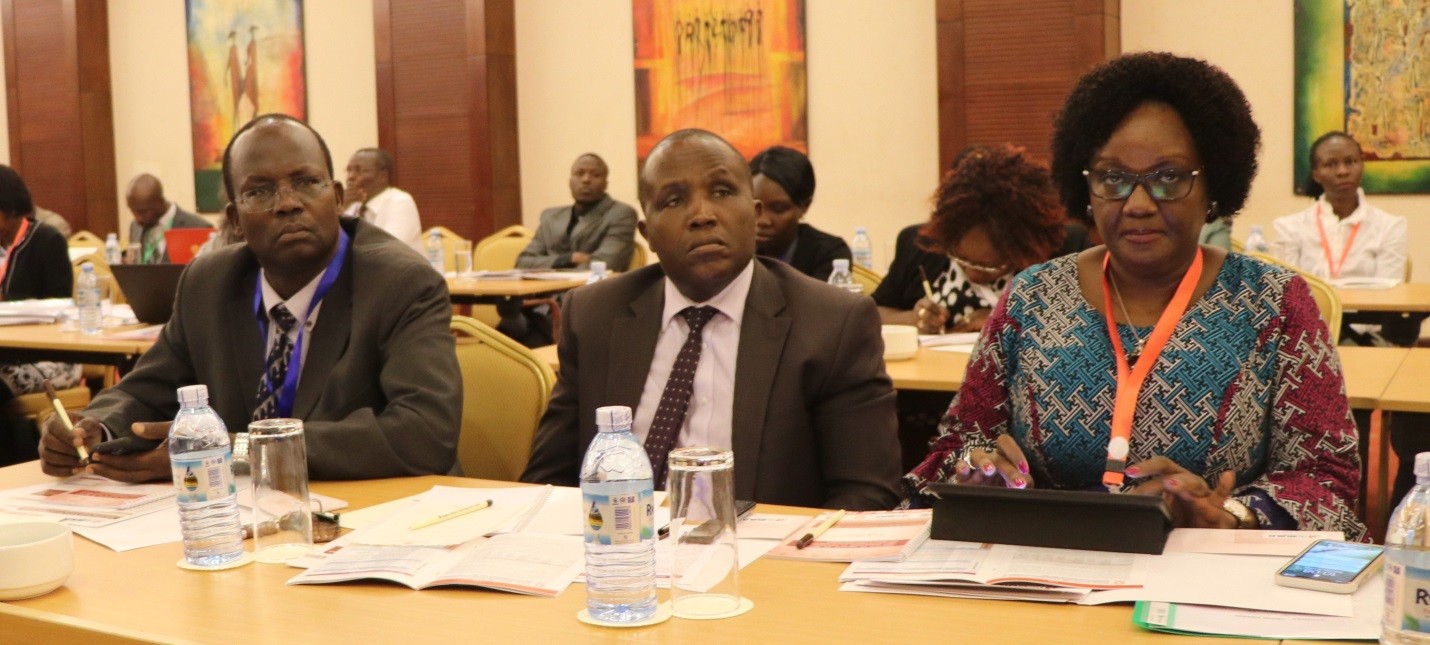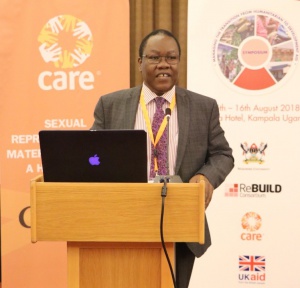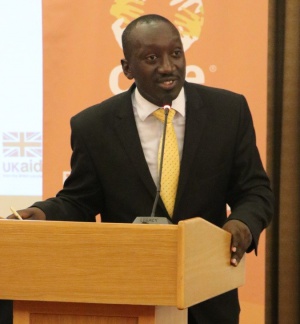
(Some of the senior staff of MakSPH at the ReBUILD symposium at the Kampala Serena Hotel on15th August 2018. L-R: Prof Christopher Garimoi Orach, Department Chair of Community Health and Behavioural Sciences and Deputy Dean of MakSPH, Prof Nazarius Mbona Tumwesigye, the Department Chair of Epidemiology and Biostatics; Prof Rhoda Wanyenze, Dean MakSPH)
On 15th August 2018, the ReBUILD project in partnership with CARE International and the UK’s Department For International Development (DFID), commenced a two – day symposium on managing the transition from humanitarian to development aid. The event which took place at the Kampala Serena Hotel placed emphasis on the effectiveness of aid and the development of health systems.
In her welcome speech, the Dean of Makerere University School of Public Health, MakSPH, Prof Rhoda Wanyenze warmly welcomed the audience to the convention. She explained the role and place of MakSPH in health systems context adding that the school had excelled in teaching relevant courses and in offering services which were spearheading research on such a scale. “MakSPH has programs that are relevant and sustainable for improving health and other social systems, programs that can bear the brunt of disasters e.g. the Master’s program in Disaster and management in the Department of Community Health and Behavioural Sciences, headed by Prof Christopher Garimoi Orach, to improve the preparedness of people who work in these settings,” she elaborated. She pledged to continue the rigorous struggle the school employs in maintaining responsiveness to the public health evidence needs in all ways necessary and she further committed to not only producing evidence-based research but also to the pursuit of acting on such data.
The Dean called on the audience to critically analyze and look for lasting solutions for more effective and efficient use of resources. She also encouraged the identification and seizing of opportunities in order to support and enhance health and social systems especially those that directly serve to improve the situation in disaster-ravaged areas. This is what will move us closer to the goal of universal health coverage.
She appreciated the organizers for putting up a forum of the magnitude of the symposium.
Prof Freddie Ssengooba, who is the lead Principal Investigator in the ReBUILD project, thanked DFID for the continuous program for the past 7 years; thanked CARE international for their financial support in organizing the event; Ministry of Health for their participation in generating knowledge particularly from Gulu, Kitgum and Amuru; and every person present. He invited members to the challenge faced by the health systems especially in conflict areas, mentioning explicitly that he had not come to offer solutions.
Citing John F Kennedy, the former president of the US, who stated that in every crisis lay an opportunity, he dared the audience to see beyond the crises, even though mitigation in conflicts is paramount especially preserving life, to opportunities within the conflict. He noted that conflicts will always occur giving an example of Uganda which has over 1 million refugees. “How do we move from the destruction that conflicts create, to a place where we think development right from when the conflict is going on so that we are not late,” Prof Ssengooba (pictured above) wondered, adding that normally first responders will run to a conflict area but only for a short time and then move to the next engagement almost as fast they come in.
He elaborated that a development agenda within conflict management and aid effectiveness values mandate and legitimacy to do so, and takes into consideration agreed on priorities between government and stakeholders, mutual accountability, alignment with national goals and ownership, sustainable development and a focus on long-term results. “Government in this model has to take lead in governance terms, and is part of the conflict and can be trusted to lead the discourse”, he recommended. He also noted the importance of systems in the effectiveness of conflict. He expressed his amusement at the many organizations that rush to conflict areas to help but end up providing the same service, and sometimes fail to realize their area and extent of the impact.
Prof Ssengooba encouraged all stakeholders to plan early to move from crisis and emergency phase to the development phase quite quickly, leveraging the resources that may flow in during emergencies to thrust conflict-stricken areas into renovation. “We need to zone out and know the organizations that deliver the services. One organization may not be able to do it alone, but duplicating the service by many players becomes a problem in itself. We need to re-align them to get the best out of them”, he suggested.
The symposium ran under the theme “Transitioning from a Humanitarian to Development Aid”
Speaking on behalf of the State Minister for Relief and Disaster – Preparedness and Refugees, Innocent Ndahirirwe (pictured above), who is charged with Refugee Integration and Legal Matters in the office of the Prime Minister, conveyed the minister’s remarks, revealing that at present, the country is disaster free.
The speech highlighted the difficulty encountered in moving people from resettlement camps in Gulu back to their original areas because of the perceived difference in services received; the camps appearing way better than homes. “We need to strengthen the coordination of aid; humanitarian development aid has more impact”, he emphasized, adding that the global sustainable development goals needed strong leadership from both the donors and recipients of aid. He thanked MakSPH for leading the research
Liverpool School of Tropical Medicine was represented at the symposium.




